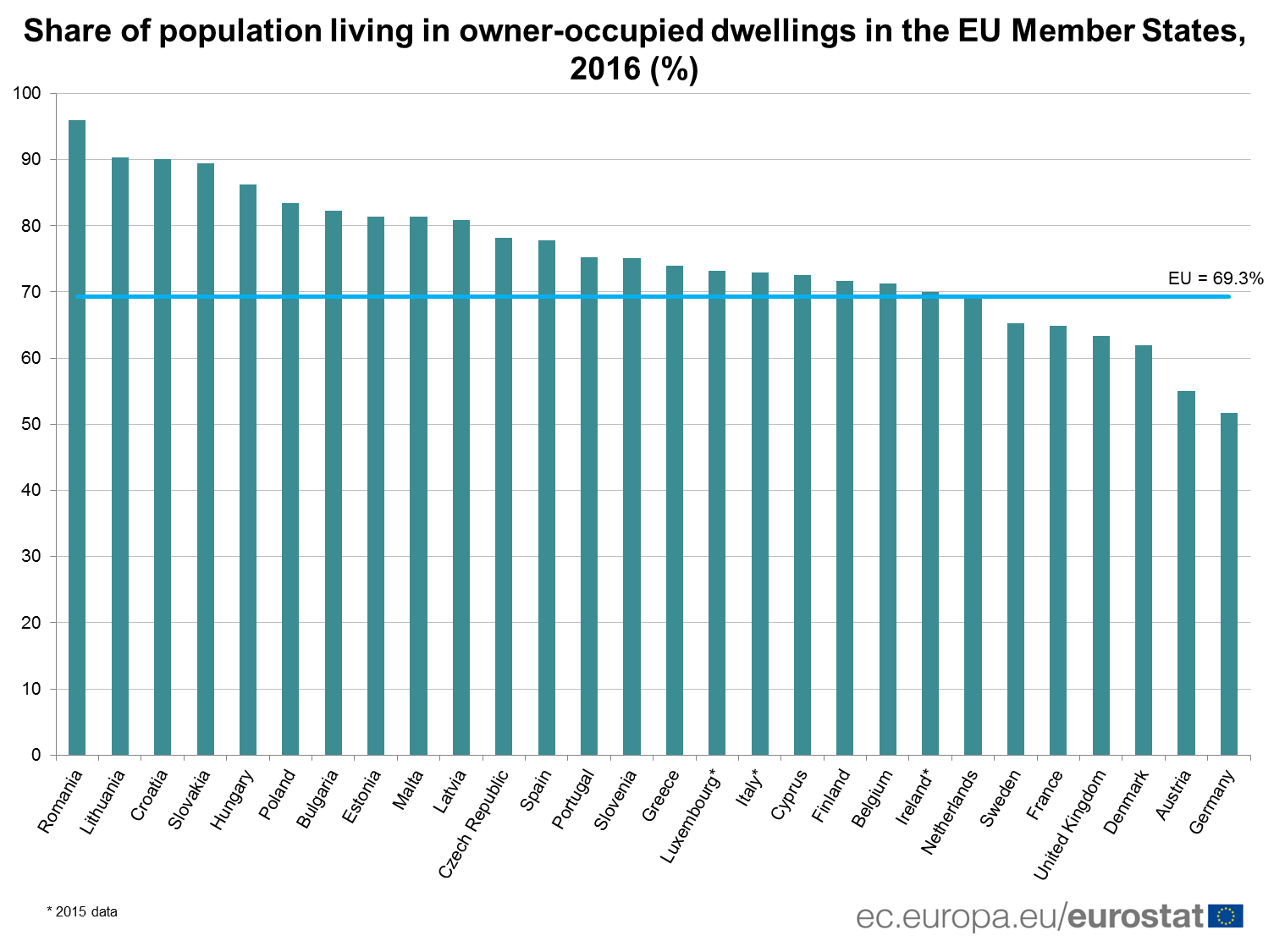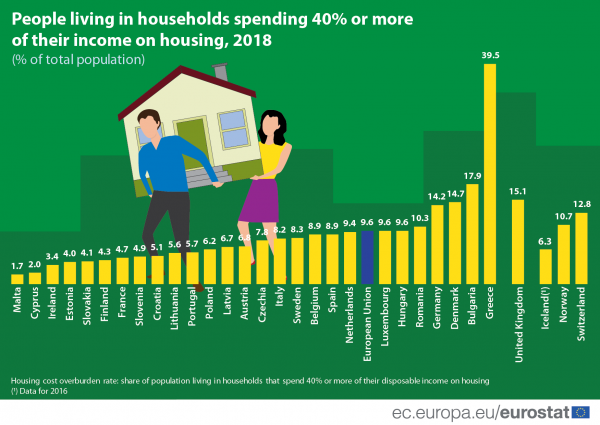We’d like to remind Forumites to please avoid political debate on the Forum.
This is to keep it a safe and useful space for MoneySaving discussions. Threads that are – or become – political in nature may be removed in line with the Forum’s rules. Thank you for your understanding.
Pitfalls of Diligent Saving
Comments
-
"Europe" isn't one place. It's a large number of different countries. Depending on what definition you use, it includes the UK.zagubov said:In Europe...
Looking at the EU27+UK, the UK was below the average rate of home-ownership.
Comments about "Europe" and rent are usually extrapolating from Germany, which is an outlier.
The UK's housing costs are a larger part of income than most EU27+UK countries, but Germany is one of the closest to the UK.
3 -
While undoubtedly true, it's also true of so many things as well as home ownership, eg car ownership, higher education, healthcare, travel abroad, etc. Your graph stretches back almost to the Victorian era so I'd be very disappointed if times had not changed significantly. There is one common factor in all of this - the average person is so much wealthier today than they have ever been, so 'historically oddities' can be a very good thing.AdrianC said:
Let's not forget that what we've got used to in current lifetimes is actually the historical oddity.Davesnave said:However, I disagree that ownership is for everyone. The expectation of good, fairly priced living accommodation should be there for everyone, but that doesn't mean ownership. 0
0 -
Except you forget one detail - the current level of home ownership was never seen before around the mid 80s. Yes, it was a bit higher around the turn of the Millennium, but not that much.Mickey666 said:
While undoubtedly true, it's also true of so many things as well as home ownership, eg car ownership, higher education, healthcare, travel abroad, etc. Your graph stretches back almost to the Victorian era so I'd be very disappointed if times had not changed significantly. There is one common factor in all of this - the average person is so much wealthier today than they have ever been, so 'historically oddities' can be a very good thing.AdrianC said:
Let's not forget that what we've got used to in current lifetimes is actually the historical oddity.Davesnave said:However, I disagree that ownership is for everyone. The expectation of good, fairly priced living accommodation should be there for everyone, but that doesn't mean ownership.
And let's look at that other graph, too. About 15% of the UK spend more than 40% of their income on housing. About 14% do in Germany, that utopian peak of rental. Denmark is about half way between the two.0 -
That doesn't make much sense to me. A very effective way to "have us over a barrel" is to prevent us from being independently wealthy. Restricting people to rented housing for their whole lives means they are always beholden to someone else for one of the most fundamental human needs - shelter, a home. It's a very effective means of oppression and forces people to work all their lives, historically until they dropped.zagubov said:I'm with many other posters here on this. In Europe you can rent good spacious property securely cheaply for your whole life and then so can your children and their children.
We used to have a system like that.
Back then being massively in debt wasn't for everyone (it was shameful).
It was deliberately dismantled to incentivise us to to acquire debt that meant we couldn't unionise our workplaces and employers would have us over a barrel.
This was done so effectively that we see it is the new normal.
Home ownership gives people a greater degree of independence, wealth, choice. If you really wanted to have people "over a barrel" then preventing them from owning their own homes is a very effective way to do so . . . as it was historically in more feudal times.
0 -
Of course, because transient details are not significant when your talking about the trends over a century.AdrianC said:
Except you forget one detail - . . . .Mickey666 said:
While undoubtedly true, it's also true of so many things as well as home ownership, eg car ownership, higher education, healthcare, travel abroad, etc. Your graph stretches back almost to the Victorian era so I'd be very disappointed if times had not changed significantly. There is one common factor in all of this - the average person is so much wealthier today than they have ever been, so 'historically oddities' can be a very good thing.AdrianC said:
Let's not forget that what we've got used to in current lifetimes is actually the historical oddity.Davesnave said:However, I disagree that ownership is for everyone. The expectation of good, fairly priced living accommodation should be there for everyone, but that doesn't mean ownership. 0
0 -
Absolutely not, but the OP didn't factor in desirabilityDavesnave said:jimbog said:
There are places in parts of the north where you can buy a house mortgage free for £17KHawley_Gryphon said:It's for the elite, the rich, the jammy, the lucky, the privileged and, every now and again, I guess it could also for the people who scrimp and save for most of their working adult life - maybe.
Home ownership SHOULD be for everyone. Would you want to live there though?Gather ye rosebuds while ye may1
Would you want to live there though?Gather ye rosebuds while ye may1 -
If the system is counting the whole lifetime ISA towards the savings limit, including the bonus, rather than the sum you would actually get to live on after withdrawal, that does seem a detail that wants tweaking.
But a banker, engaged at enormous expense,Had the whole of their cash in his care.
Lewis Carroll2 -
If you have a mortgage on a house and by taking part in union action you risk losing your job and there the possibility of losing your home by not being able to pay the mortgage, then you are going to be much more reluctant to take part in such action.Mickey666 said:
That doesn't make much sense to me. A very effective way to "have us over a barrel" is to prevent us from being independently wealthy. Restricting people to rented housing for their whole lives means they are always beholden to someone else for one of the most fundamental human needs - shelter, a home. It's a very effective means of oppression and forces people to work all their lives, historically until they dropped.zagubov said:I'm with many other posters here on this. In Europe you can rent good spacious property securely cheaply for your whole life and then so can your children and their children.
We used to have a system like that.
Back then being massively in debt wasn't for everyone (it was shameful).
It was deliberately dismantled to incentivise us to to acquire debt that meant we couldn't unionise our workplaces and employers would have us over a barrel.
This was done so effectively that we see it is the new normal.
Home ownership gives people a greater degree of independence, wealth, choice. If you really wanted to have people "over a barrel" then preventing them from owning their own homes is a very effective way to do so . . . as it was historically in more feudal times.
If however your housing is provided by the state then you are not going to be that bothered.4 -
Here's the crux of it though, they don't, or can't, care, whether it seems fair or not, because it comes down to only supporting those in greatest need. OP, by your actions in being thrifty, you've taken yourself out of the "greatest need" bracket
But that is not how it works in reality.
Case 1 - Someone lives in a million pound house, mortgage all paid off. They have £10,000 in savings. They could if they wish sell that house and buy a perfectly nice £500,000 and live off the money this releases. Or they could stay put and they would qualify for benefits.
Case 2 - The OP. Has been desperately saving to try and afford a modest house and so has more than £16,000 in savings. No home owned. No entitlement to benefits.
I would argue that case 2 is in the greatest need, but they are not the ones that get the help.
3 -
I don`t think you get what the term "independently wealthy" really means? It doesn`t mean scraping onto the housing ladder because the Lords and Masters have waived Stamp Duty for a few months with massive debt that will cripple you if interest rates rise.Mickey666 said:
That doesn't make much sense to me. A very effective way to "have us over a barrel" is to prevent us from being independently wealthy. Restricting people to rented housing for their whole lives means they are always beholden to someone else for one of the most fundamental human needs - shelter, a home. It's a very effective means of oppression and forces people to work all their lives, historically until they dropped.zagubov said:I'm with many other posters here on this. In Europe you can rent good spacious property securely cheaply for your whole life and then so can your children and their children.
We used to have a system like that.
Back then being massively in debt wasn't for everyone (it was shameful).
It was deliberately dismantled to incentivise us to to acquire debt that meant we couldn't unionise our workplaces and employers would have us over a barrel.
This was done so effectively that we see it is the new normal.
Home ownership gives people a greater degree of independence, wealth, choice. If you really wanted to have people "over a barrel" then preventing them from owning their own homes is a very effective way to do so . . . as it was historically in more feudal times.0
Confirm your email address to Create Threads and Reply

Categories
- All Categories
- 352.2K Banking & Borrowing
- 253.6K Reduce Debt & Boost Income
- 454.3K Spending & Discounts
- 245.2K Work, Benefits & Business
- 600.9K Mortgages, Homes & Bills
- 177.5K Life & Family
- 259K Travel & Transport
- 1.5M Hobbies & Leisure
- 16K Discuss & Feedback
- 37.7K Read-Only Boards





